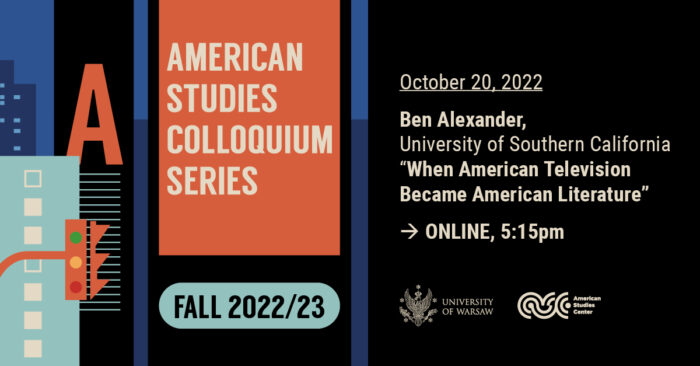We are delighted to invite you to the third talk of the Fall 2022/2023 semester of the American Studies Colloquium Series:
Ben Alexander
(University of Southern California)
When American Television Became American Literature
This is an online event.
Thursday, October 20, 2022
at 5:15 p.m.
You can get 2 OZN points for participating in this event.
Check how to collect OZN points online here.

Where?
This lecture will be streamed online. To attend, click the button below or enter https://uw-edu-pl.zoom.us/j/92641711702 into your browser, and join the meeting.
What?
For several years Seinfeld (a show notoriously about “nothing”) dominated American television. Season 4, Episode 16 of Seinfeld is entitled The Pitch and first aired on September 16, 1992. The episode features Jerry Seinfeld and George Costanza discussing a script they intend to submit to NBC as a ‘pilot’ for a prospective television comedy based on life of Jerry Seinfeld. This come from their conversation:
JERRY: So you’re saying, I go in to NBC, and tell them I got this idea for a show about nothing.
GEORGE: We go into NBC.
JERRY: “We”? Since when are you a writer?
GEORGE: (Scoffs) Writer. We’re talking about a sit-com.
In 2015 President Barak Obama asked to interview David Simon (creator of The Wire). This itself is extraordinary. During the course of the interview Obama offered that The Wire is, “one of the greatest — not just television shows, but pieces of [American] art in the last couple of decades.”
I suggest that between 1992 and 2015 Americans engaged in a fundamental revaluation of the very nature of “television” and, that between the years 1999 (debut the Sopranos) and 2015 (the final season of Mad Men) the most dynamic and poignant America art concentrated amid the production of a relatively new genre: the American serial drama that are most fully represented: The Sopranos, The Wire, Deadwood and Mad Men.
My discussion places the phenomena of these serial dramas in full historical context. I believe that beginning in 1973 (when Gerald Ford offered a full pardon to Richard Nixon) America gave rise to a culture of unprecedent fraud and deceit: Iran Contra, Bill Cosby, Lance Armstrong, Mark McGwire, Tiger Woods, Enron, the US Lead Invasion of Iraq, Hurricane Katrina, the Opiod Epidemic, the Financial Crisis of 2007 – 2008 etc.
In response, I suggest that dating from 1999 the most powerful portrayals of the complexities, hypocrisies and even revelations of the fundamental nature of the American character played out on American television screens. Indeed, many of the protagonists associated with these shows offer profoundly new perspectives on the confrontation between fundamental American values and the realities of a society and culture that is fundamentally off balance or, worse, actually conspires against traditional celebrations of the American character. In (relative) hindsight I suggest that the rise of the serial drama constitutes another fabulous moment in American culture (Harlem Renaissance, Southern Literature etc.) where the periphery of American culture was best posed to portray and criticize America.
In conclusion, I suggest my very title is fundamentally wrong (or at least anachronistic). The art discussed is neither “television” (at least in any conventional sense of the term) nor is it “literature.” Rather, I think we are discussing a new art form that will require a new critical approaches.
Who?
Ben Alexander holds an MA in American Literature from Columbia University and a PhD in American Literature from the Graduate Center of the City University of New York. Concurrent with his graduate study, Alexander worked as Rare Books and Manuscripts Specialist for the New York Public Library.
Alexander has held full-time faculty appoints at (in chronological order), University of California Los Angeles, Queens College, Stanford University (Visiting Scholar Department of English and Digital Lit Lab), Sichuan University, Harvard University (Visiting Scholar, Department of English), Columbia University (Visiting Scholar and Lecturer, Department of English), and the University of Southern California.
Alexander has published in academic journals, such as American Archivist, Archival Science, English Studies Canada, and, the New England Quarterly. He is currently finishing a monograph entitled, Yaddo: Shaping The American Century (Cornell University Press) and is co-editing two additional volumes: When American Television Became American Literature (Brill) and Remembering and Re(re)membering Social Justice in the 21st Century (FACET).
Working with graduate students from the University of Southern California Alexander is developing several DH projects; including, The American Century Project, intends a globally comparativist perspective on United States history ca, 1900 – 2000; When American Television Became American Literature (includes students from both USC and Columbia), and The American Civil War in global contexts.




